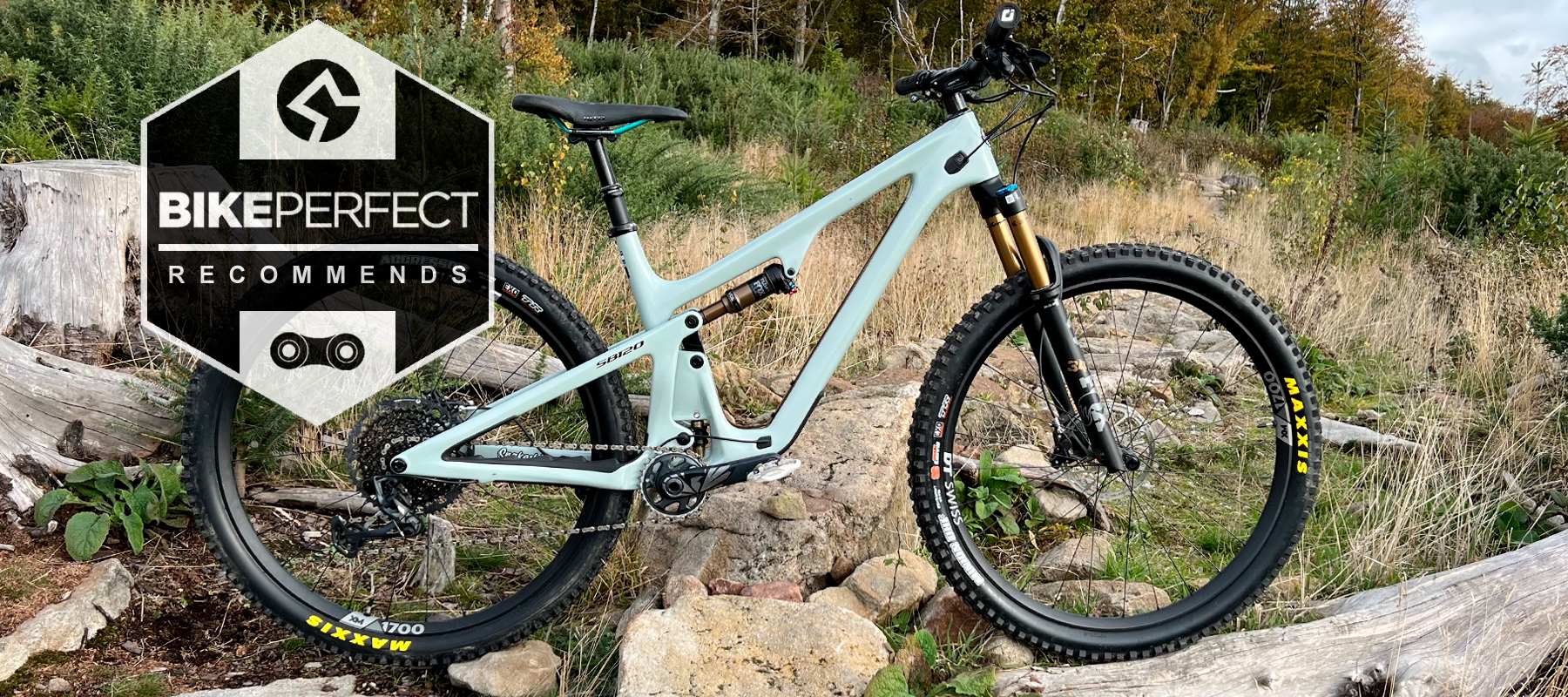Bike Perfect Verdict
If cash or XC weight aren’t concerns, the SB120 is the effortlessly fast, beautifully balanced and blissfully easy to ride short travel mountain bike Yeti fans have been wanting for years.
Pros
- +
Superb overall dynamic feel
- +
Brilliant suspension performance
- +
Sorted all round geometry
- +
Lifetime Warranty
Cons
- -
Expensive
- -
Relatively heavy
- -
Unproven suspension upgrades
- -
Limited UK build options
Why trust BikePerfect
Hard riding short travel trail bikes are one of the hottest mountain bike categories right now. The new Yeti SB120 seriously turns up the heat on the competition and I reckon it’s one of the best mountain bikes I’ve ever ridden.
Yeti have had short travel SB110 and SB115 models in their range for a while but stunted geometry and relatively high weights meant they were poor relations to the enduro dominating SB150 bike. The new SB120 is a totally new machine, and it’s far better than its predecessors as a result.
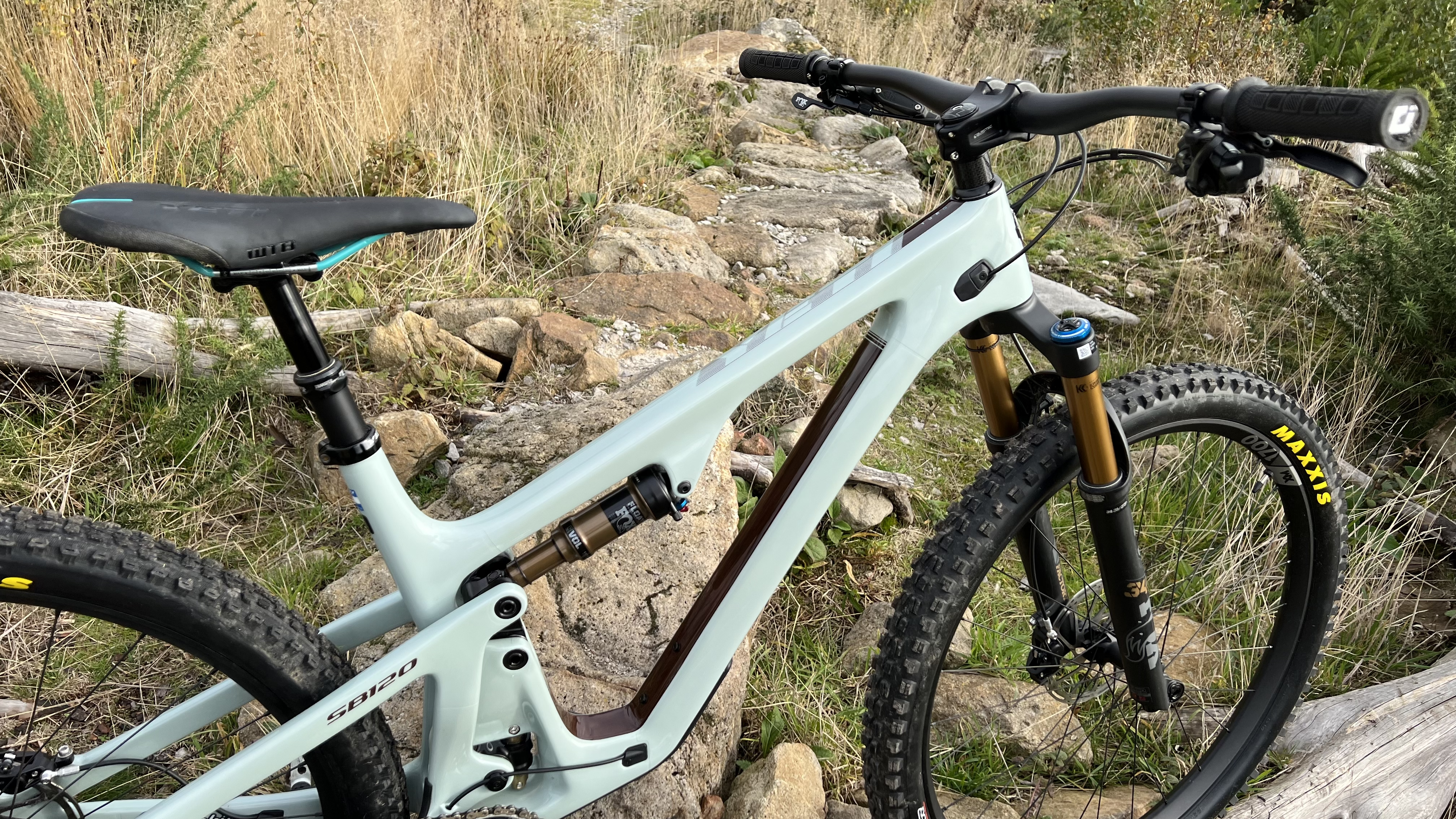
Design
The SB120 shares a much more family look with the SB130 and SB160. Mainly because Yeti’s signature ‘Switch Infinity’ twin-shaft suspension design is mounted inline in an open window, not transverse behind a bolt-on cover. While the 66.5-degree head angle of the SB120 is only a degree slacker than the SB115, the reach on a large frame gets a very significant – and long overdue – extension to 475mm. The seat tube steepens to 76.5 degrees from 74 degrees too, so while the frame isn’t as neat, it’s 300g heavier and the Switch Infinity shaft is more exposed, it doesn’t look or fit like the dimensions were decided without proper consideration. It also means you can fit a long stroke dropper into most frames. Someone at Yeti missed the memo that every new bike has to have an internal storage compartment, so don’t bother looking for hidden doors.
The very cunning knuckle shock driver and short linkage is similar to the Yeti SB160 (but with an 11 percent progression rate, not a 17 percent rate), however, shock length and stroke are the same as the SB115. All Turq bikes (the more expensive version with a lighter carbon lay up) also get a completely reworked version of the Switch Infinity system. Cue new floating collet axles, Enduro Max bearings, bushings and coatings to increases slipperiness and durability. Dual density replaceable rubber belly and sculpted stay armor, fully plumbed and clamped internal control lines (thankfully not inside the headset) ISCG chain guard tabs, plus a threaded alloy BB that’s molded into the frame not just glued put it back on again. Add enough carbon in the right places to underwrite a no questions asked lifetime warranty and at 3kg for a medium frame, it’s definitely no XC racer when it comes to mass. Yeti haven’t been tempted to go with an enduro style piggyback damper, just an inline DPS shock so that saves some weight compared to similar short travel rally bikes like Canyon’s Spectral 125. It’s presumably part of the reason the frame only price is $700 less than the SB160 at ‘just’ $4300 too.
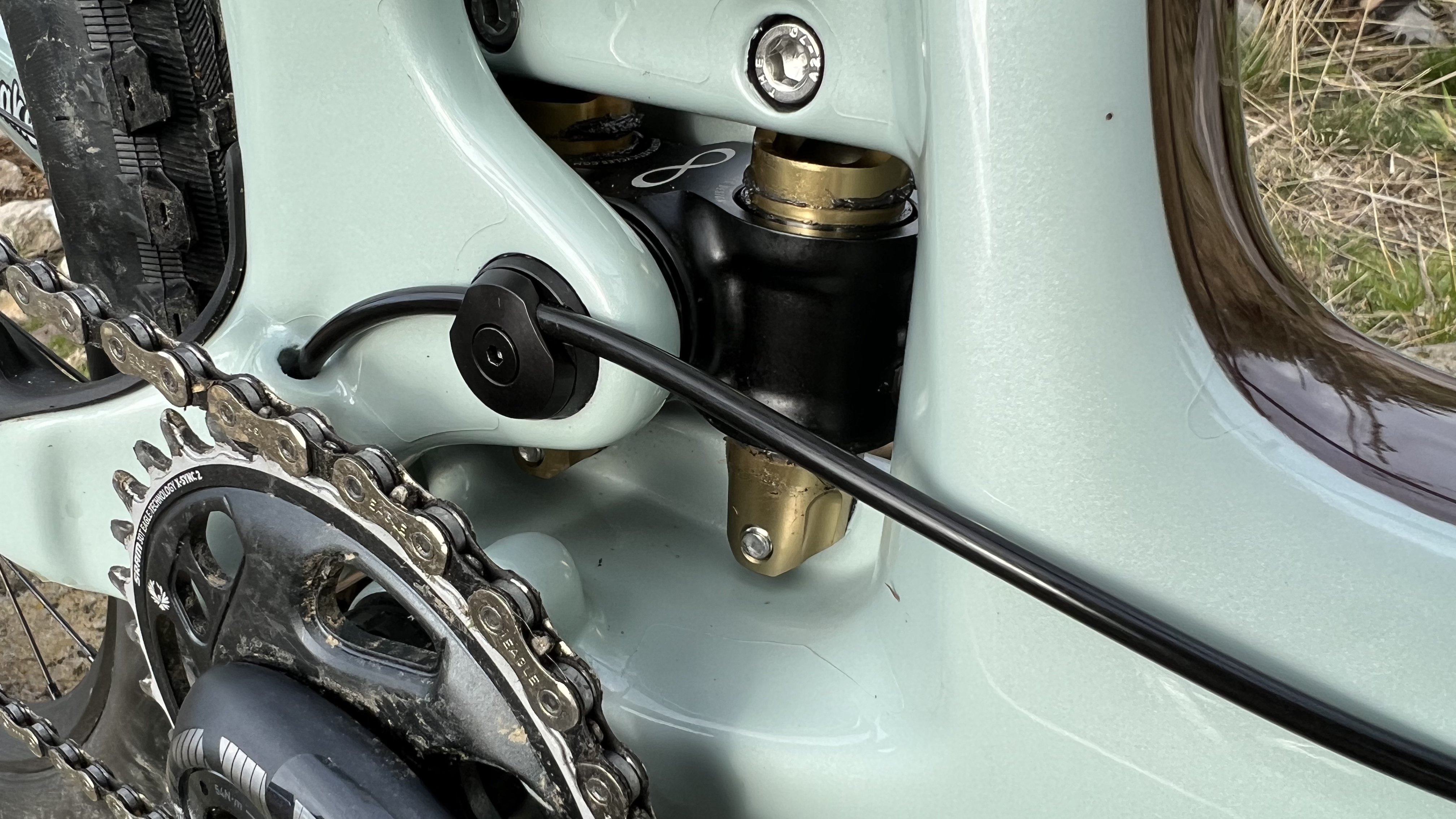
Components and specification
The spec on the T1 model I rode is a welterweight mix. On the punchy side there’s a 2.5in Maxxis Minion DHF tire up front, chunky Burgtec Enduro MK3 stem, a 200mm stroke on the Fox Transfer dropper post and tough DT-Swiss XM1700 30 alloy wheels. A 130mm travel Fox 34 fork, 180mm front rotor and 2.3in Maxxis Aggressor rear tire keep it lighter on its toes though. But if really you want to amp up acceleration and altitude gain there’s a T4 ‘Pinner’ option for $12,100. This gets Maxxis Rekon and Rekon Race tires, a lightweight, short stroke Transfer SL post and DT Swiss EXC 1501 carbon wheels as standard.
Otherwise, there’s a T3 option which uses wireless SRAM X01/GX Eagle rather than wired but still gets Factory spec Fox suspension for $8200. Or C1 and C2 models with the more basic SI suspension, Fox Performance fork and shock pairing, and a Shimano SLX/XT or SRAM GX mix for $6300 and $6600 respectively.
If you’re reading this in the UK though there are currently only £8199 T1 and £6799 C2 options available. You do get all four color choices: Yeti Turquoise, Dust, Raw Carbon and the Loch seen here.

Ride and performance
Most people pushing towards five figures on a bike spend will probably be able to change any bits they don’t like, or get their Yeti dealer to do it for them. However, the spec is a really good place to start describing what the SB120 does.
For example, I’ve never seen the point in the Maxxis Aggressor tire. For where I ride its mix of mediocre soft/loose grip and slightly better than average rolling makes no sense. I either fit a proper grippy tire or a really fast rolling one and deal with the consequences. On the back of the Yeti though the Aggressor felt awesome. Traction was consistently excellent on the notorious tech jank singletrack of Stainburn trail center. Tons of feedback to work with through the cranks but no choke chain pull back if I slapped something big at slow speed. Yet any tensing of the muscles, would subtly tense the rear end too, always encouraging me to kick the power down out of corners or dead stop features on climbs and creating a truly inspiring, super efficient upward flow.
In fact at well over 13kg without pedals, it was a real shock how keen it was to climb and how fast it did it compared to 1-2kg lighter race bikes I’ve been lapping the same trails on recently. It’s the same massive overachiever on descents too. Flowing rocky, rooty sections with a ridiculous amount of speed sustain for a 120mm travel bike that never felt like it was in danger or pinch flatting the 2.3in rear tire. While it uses travel generously when it needs to, it still gives solid support and consistent ride height through the hardest turns, eventually squeezing the rear tire outwards but in a clearly communicated and predictable hero drift.
What’s remarkable is that it does all of this best of everything balancing ‘automatically’. It seems daft that the unique ‘inflection’ movement of the main pivot can really make this much difference, but I’ve been here before on previous SI bikes and had to concede it does. And if you dive into the science of instant centers, projected pivots and other kinematic buzz words you'll see that rise and fall movement effectively creates an infinitely long lower linkage: Hence Switch Infinity and why the Yeti system feels so remarkably nuanced and seemingly sentient compared to purely short linkage systems. Obviously there's still a mass of testing and tweaking to make sure the right things are happening are happening at the right time to make it feel so great. But then Yeti have been playing with left field suspension designs for decades, so it's no surprise they've got things so well dialed now. The new pivots, bearings, bushings, coatings and axles seem even more fluid and floated too, adding even more sensitivity, auto grip and flutter fast responsiveness too.
The other great thing about the SB120 is that they’ve tuned the frame structure to flatter over longer distances with lighter kit. Effective rear end lengths go up by 2mm each size and Yeti have created a different carbon lay up for each size to keep ride vibe similar for bigger and smaller riders. On the trail that means there’s still plenty of precision and the SB-120 loves to throw its 780mm Yeti carbon bars towards the ground on every corner entrance and hold them there with maniac determination through the Macc lads forged stem ingot. It’s nowhere near as blunt and brutal as the SB150 though, so even with less travel it never made my arms explode or blew my feet off the pedals. That syncs perfectly with the Fox 34 Factory –our current favorite mid travel fork – with it’s awesome GRIP2 damper and curated chassis flex. That means everything about the front end and how the bike interacts with the trail feels even better than it normally does. A big statement when I think about how many Maxxis Minion DHF tires I must have ridden over the years, but one I’m totally happy to make. Even the ODI grips felt like the best ODI grips I’ve used, but somehow despite this delicious composure and serene smoothness, the POV ride video I shot while testing looks comically sped up in terms of how fast trees, rocks and whole trail sections are flashing past. It even seems to freewheel faster than it has any right to, and the only time it gets remotely grumpy is if you start pulling the brakes when it would rather you just let it run.
The fact that everything from tires to grips to saddle, to mid corner or black grade, boulder run body position always seemed to be in totally the right place is a tribute to how dialed the overall geometry is on the SB120. Nothing radical, intrusive or prescriptive, just a brilliant place to be to enjoy all sorts of trails and make the most of your skills and fitness without even thinking about the bike.
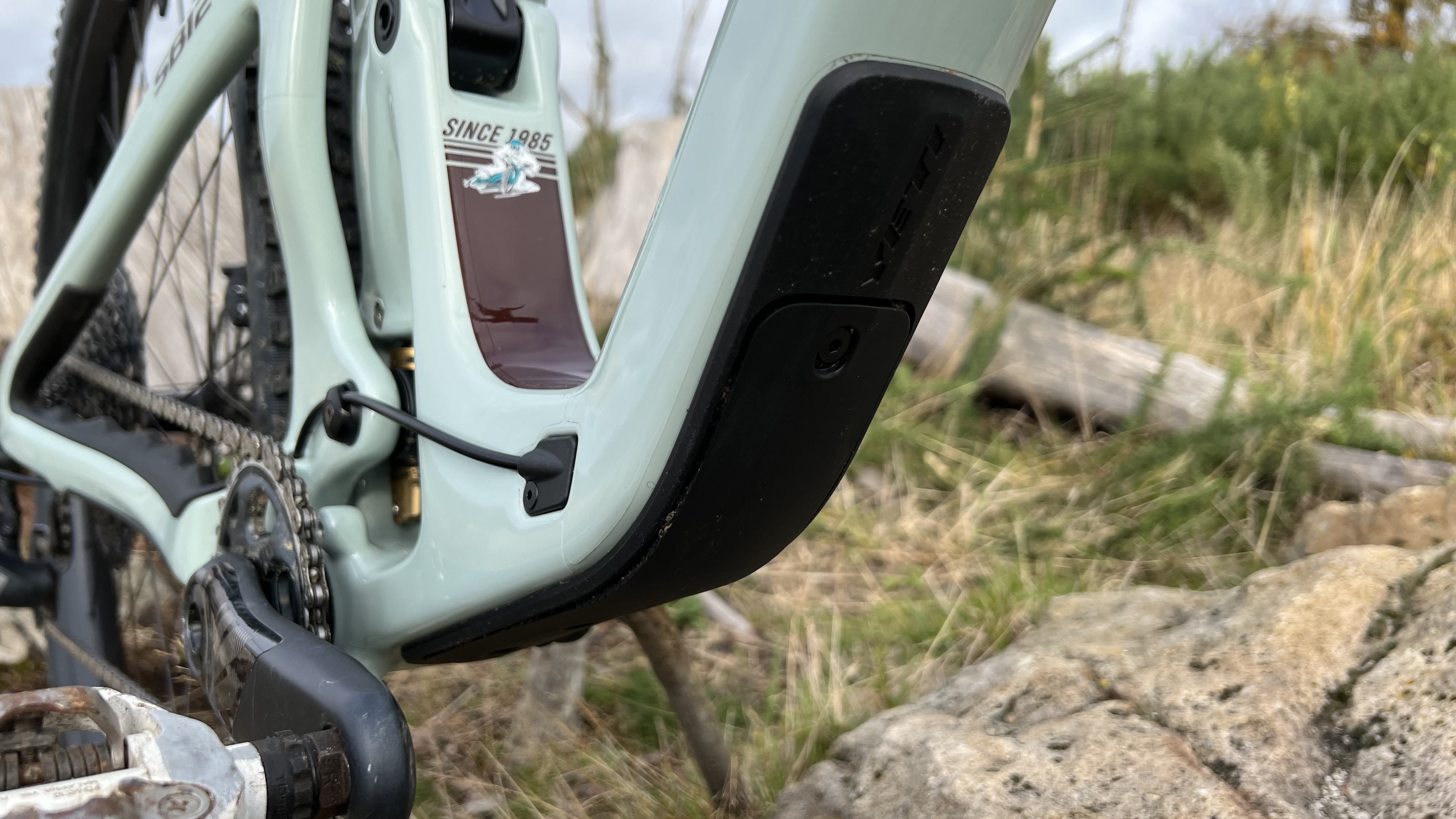
Verdict and release date
I was limited to a few hours ride time on the SB120, but even after a few minutes it was clear how blissfully sorted the balance of the whole bike was. What’s most impressive is that firstly it generates such standout overall performance from an inline shock and 120mm of travel. And secondly it manages to create a 'best ever' relationship between you and the trail without you thinking about it.
So yes, it is very expensive even without carbon wheels and the frame is 1-1.3kg heavier than the lightest 120mm downcountry bikes. The short travel trail bike arena is increasingly crowded and I’ve not ridden the latest Santa Cruz 5010 or Tallboy yet or the mythically marvelous Transition Spur which has defined short travel performance for two years. There's no third party proof that the new Switch Infinity system is actually more durable either.
Despite all that, if you asked me right now what’s the best short travel trail bike I’ve ever ridden, it’d be this one. I just need to work out how to get one to keep for a bit longer and persuade the UK distributors to get the ‘Pinner’ spec in too.
As for the release, UK distributors, Silverfish, tell us their SB120 models will be available from January 20th, while the US bikes are expected earlier that month.
Test conditions
- Temperature: 10-12 degrees C
- Conditions: Hero dirt with occasional greasy root and rock sections
- Trails: Stainburn red, black official loops and an almost full house of the off piste parts
Tech specs: Yeti SB120 T1
- Discipline: Trail
- Price: £8199, €9490, $8200
- Head angle: 66.5 degrees
- Frame material: Turq Carbon
- Size tested: Large
- Sizes available: XS to XXL
- Weight: 13.3kg
- Wheel size: 29x2.5/2.3in
- Suspension: Fox Factory 34 GRIP2 130mm travel fork, Fox Factory DPS 120mm travel rear shock
- Drivetrain: SRAM X01 Eagle rear, GX shifter 10-52T 12 speed cassette and chain. SRAM X1 Eagle 30T chainset with threaded DUB BB
- Brakes: SRAM G2 RSC with 180/180mm rotors
- Tires: Maxxis Minion DHF MaxxTerra EXO 29 x 2.5in front, Aggressor 29 x 2.3in rear
- Wheelset: DT Swiss XM1700 30
- Bar and stem: Yeti 780mm carbon riser bar and Burgtec Enduro Mk3 50mm stem
- Grips: ODI Elite Pro
- Seatpost: Fox Transfer 31.6mm x 200mm dropper
- Saddle: Custom Yeti WTB Silverado saddle
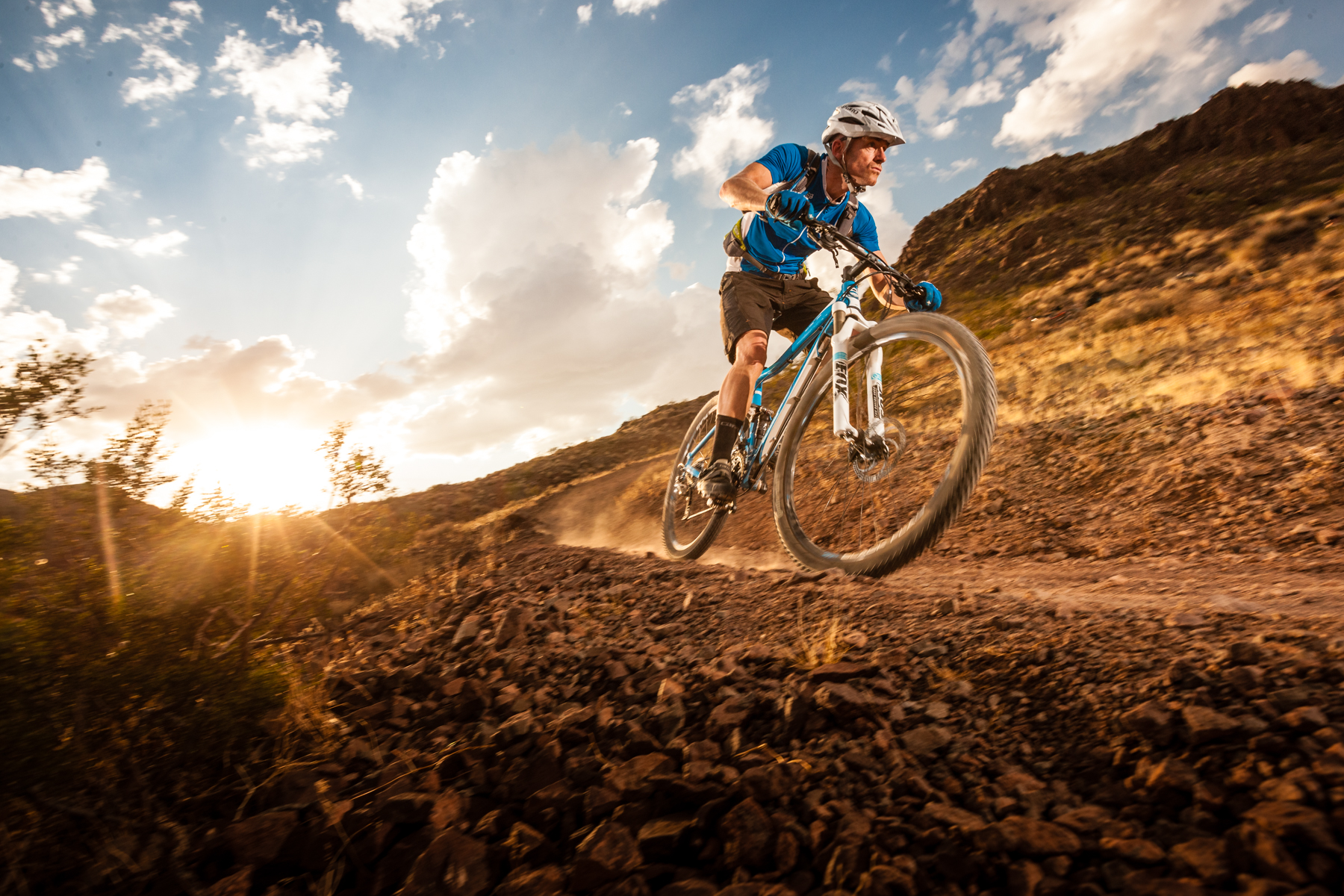
Guy Kesteven has been working on Bike Perfect since its launch in 2019. He started writing and testing for bike mags in 1996. Since then he’s written several million words about several thousand test bikes and a ridiculous amount of riding gear. He’s also penned a handful of bike-related books and he reviews MTBs over on YouTube.
Current rides: Cervelo ZFS-5, Specialized Chisel, custom Nicolai enduro tandem, Landescape/Swallow custom gravel tandem
Height: 180cm
Weight: 69kg
